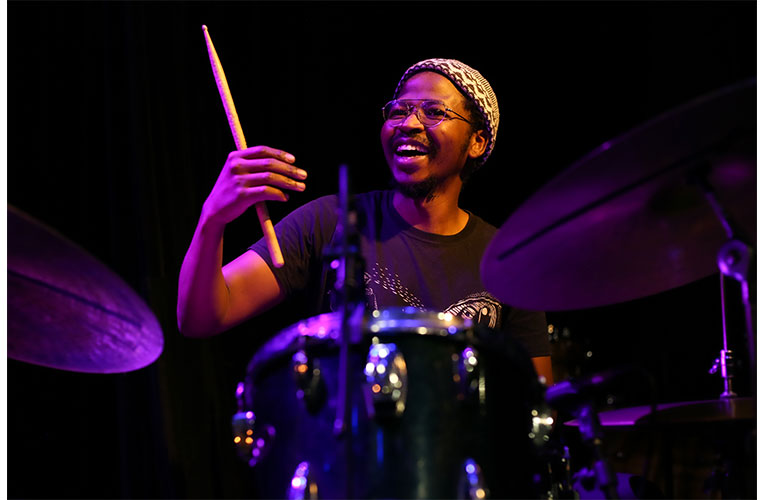Talented jazz drummer Tumi Mogorosi invites you to witness him and ensemble perform Group Theory: Black Music at Joburg Theatre
By Edward Tsumele, CITYLIFE/ARTS Editor
He has been around for a relatively long time to have made an impact and even a disruption in the jazz music tradition, particularly the performance part of it. And usually musicians who become leaders of bands are not mainly drummers, even though the drum is a dominant part of any performance. Not only does the drum has the ability and power to infect the audience’s relationship with a performance ensemble, but at times can drown all the other sounds.
The drum can also lead a band or an ensemble in performance, through its rhythmic patterns, guiding other instrumentalists and vocalists about the tempo of the performance. That is the direction that the performance is taking at different stages during a concert.
That is whether it is up tempo or low tempo. There is also something about the drum in a performance that has healing powers in the hands of a gifted artist. One such artist is talented jazz drummer Tumi Mogorosi, and those that have witnessed him in performance will tell you that this musician embodies everything of the above. Plus more, such as not fearing to experiment and risk failing, or actually achieving an amazing feat, such as find a new style, a new way of making and performing music that takes an artist’s career higher and higher.
Mogorosi in the past few years has been experimenting with sound, in a bid to find a new way of presenting his music. The case in point is his new album, and those that have had an opportunity to lay their hands on the album or to lend their ears to it, all speak praises of it. In short, this means that his experimentation is currently taking his music career to new heights.

It is for this reason that die-hard Mogorisi fans will be excited to hear that he has a performance this October where he is going to perform material from this new album. This performance is on 28 October whereby Mogorosi will present Group Theory: Black Music in all its majesty for the people, with the people, at the People’s Theatre in the Jo’burg Theatre precinct. This gig is sure to attract Mogorosi’s diehard fans and the potential to hook those that may not necessarily be exposed to his sound.
If there is what is called genre, the political signature that Mogorosi’s Group Theory: Black Music installs, is an aesthetic that blurs this fixture, this category, this fuss. Mogorosi speaks to the signs of the times by way of critical takes, responses, diagnosis, and perpetual questioning. In this upcoming performance, Mogorosi and his ensemble are coming together to make an offering.
Mogorosi encounters of black study in communion and assembly with the audience. This gathering is about taking a journey together and pausing to reflect, taking in what is offered, digesting, and then moving forward to a destination unknown.
By inhabiting the theatre as a space, Mogorosi invites us to be part of the ensemble, to bear witness to the album not only in a live setting but with new ears, in silence. This is the currency of generativity, an experiment that provides “extra” — the lyrical application, the exit of the whole that is genre; that is, the political re-reading of the work of art. We are invited, therefore, to come and absorb together, in silence and joy — black study.
“I started out in a choir,” says Mogorosi, as he reflects on the significance of Black voices in concert.
“There’s this idea of mass, of a group of people gathering, which has a political implication. And the operatic voice has both a presence and a capacity to scream, a capacity for affect. The instrumental group can sustain the intensity of that affect, and the chorus can go beyond improvisation, toward communal melodies that everyone can be a part of.”
The album is in lineage with the black radical leanings of the South African songbook and tradition. Worth noting, also, is its explicit resonance which bears the stamp of what Fred Moten and Stefano Harney refer to as “black study”… The work of an ensemble is what Mogorosi offers, and that is why the titling is apt — Group Theory: Black Music.
The album carries traces of Amiri Baraka’s robust but tender communal thought. Mogorosi’s titling critiques the very idea of individuation, and calls for the invitation of the common project. It is only in the context of the ensemble that the common project can be discerned.
By way of gathering, the album, as a site of study in a theatre setting, will be a performance that is not in the name of the event but the continued project. Here, in anticipation, and thus through the protocols of black study, the marked barrier of what is the stage and the auditorium will be blurred. In the invitation of communally sharing, Group Theory: Black Music gestures at making possible the aural experience as a whole bodily sensorium.
By pointing towards deep listening, this is an invitation to be in the realm of silence. Mogorosi and the ensemble speak in the name of this silence — by fulfilling the liberatory impulse of this long black radical tradition. The music that erupts, that chants and speaks and weeps from this silence, is what will be shared.
There you have it, and therefore this is a show that promises to leave audiences with something special, something to talk about and take home long after the show is over.
To buy tickets go to: https://bit.ly/3D5SayH










